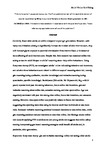Internet Safety and the Silver Surfer: The Relationship Between Gist Reasoning and Adults' Risky Online Behavior
| dc.contributor.author | White, CM | |
| dc.contributor.author | Gummerum, M | |
| dc.contributor.author | Wood, S | |
| dc.contributor.author | Hanoch, Y | |
| dc.date.accessioned | 2017-05-26T13:51:21Z | |
| dc.date.issued | 2017-03-08 | |
| dc.identifier.issn | 0894-3257 | |
| dc.identifier.issn | 1099-0771 | |
| dc.identifier.uri | http://hdl.handle.net/10026.1/9363 | |
| dc.description.abstract |
Currently, fewer older adults are online compared with younger generations. However, with many new initiatives aiming to significantly increase the number of older internet users, they will increasingly be exposed to potential victimisation from internet fraud, a fundamental issue affecting all adult internet users. Despite this, little research has examined online risk-taking across the adult lifespan or adults' reasoning about risky online behaviors. Using fuzzy trace theory, we investigated adults' online risk-taking behavior and intentions, and whether these behaviors were related to different ways of reasoning about risk, namely, gist reasoning (using qualitative, intuitive knowledge) and verbatim reasoning (using quantitative, specific knowledge). Participants (326 adults, 18–79 years old, Mage = 49.54 years) reported their past risk-taking behavior, future online risk intentions, gist and verbatim reasoning about online risk, sensation seeking, and time spent online. Age was negatively correlated with past risk-taking, time online, future risk intentions, and sensation seeking. However, time spent online was positively related to future risk intentions, suggesting that spending more time using the internet could lead individuals to take more risks. Increased verbatim reasoning predicted increased intentions to take online risks, while gist reasoning predicted reduced intentions to take risks online. Our findings extend online risk research applying fuzzy trace theory to adolescents and young adults and suggest that online safety training incorporating gist-based reasoning strategies could benefit all adults and, in particular, older generations. Copyright © 2017 John Wiley & Sons, Ltd. | |
| dc.format.extent | 819-827 | |
| dc.language | en | |
| dc.language.iso | en | |
| dc.publisher | Wiley | |
| dc.subject | fuzzy trace theory | |
| dc.subject | gist and verbatim reasoning | |
| dc.subject | online risk-taking | |
| dc.subject | older adults | |
| dc.title | Internet Safety and the Silver Surfer: The Relationship Between Gist Reasoning and Adults' Risky Online Behavior | |
| dc.type | journal-article | |
| dc.type | Article | |
| plymouth.issue | 4 | |
| plymouth.volume | 30 | |
| plymouth.publication-status | Published | |
| plymouth.journal | Journal of Behavioral Decision Making | |
| dc.identifier.doi | 10.1002/bdm.2003 | |
| plymouth.organisational-group | /Plymouth | |
| plymouth.organisational-group | /Plymouth/REF 2021 Researchers by UoA | |
| plymouth.organisational-group | /Plymouth/REF 2021 Researchers by UoA/UoA04 Psychology, Psychiatry and Neuroscience | |
| plymouth.organisational-group | /Plymouth/Research Groups | |
| plymouth.organisational-group | /Plymouth/Research Groups/Centre for Brain, Cognition and Behaviour (CBCB) | |
| plymouth.organisational-group | /Plymouth/Research Groups/Centre for Brain, Cognition and Behaviour (CBCB)/Behaviour | |
| plymouth.organisational-group | /Plymouth/Research Groups/Centre for Brain, Cognition and Behaviour (CBCB)/Cognition | |
| dcterms.dateAccepted | 2016-11-15 | |
| dc.rights.embargodate | 2019-3-8 | |
| dc.identifier.eissn | 1099-0771 | |
| dc.rights.embargoperiod | 24 months | |
| rioxxterms.versionofrecord | 10.1002/bdm.2003 | |
| rioxxterms.licenseref.uri | http://www.rioxx.net/licenses/under-embargo-all-rights-reserved | |
| rioxxterms.licenseref.startdate | 2017-03-08 | |
| rioxxterms.type | Journal Article/Review |


